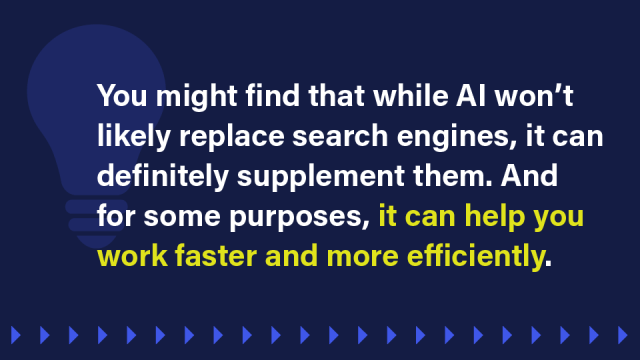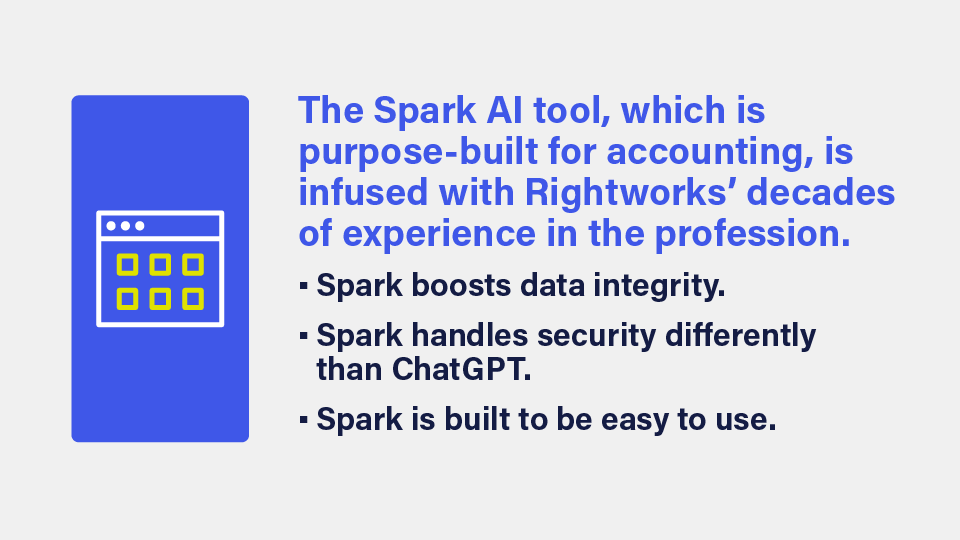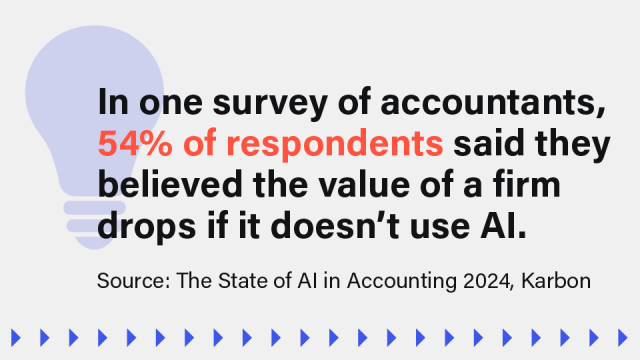There was once skepticism about the staying power of the internet, and not just from obscure luddite journals or doomsday prophets. No less a light than Newsweek—a big publication back then—ran an article in 1995 that expressed doubt that people would ever shop online or read from anything other than paper.
Perhaps more infamously, the British tabloid the Daily Mail suggested five years later that the internet “may be just a passing fad.” It’s telling, perhaps, that a direct link to the Daily Mail piece seems just about impossible to find; the link in the previous sentence includes a scanned photo of the article. However, you can buy a poster emblazoned with an image of the infamous story—or a t-shirt, sticker, mug or blanket. All online, of course.
Now artificial intelligence (AI) is a Nascent technology that seems to have as many doubters as supporters, if not more. In a recent podcast, two Rightworks experts discussed the present and future of AI in general and in particular, accounting.
AI is in the spotlight

It’s obvious that the internet survived the negative hype and revolutionized life for people all over the world. And now we stand at a similar place with AI. ChatGPT and other AI tools have sparked curiosity, skepticism, excitement…and maybe a little fear.
But will they prove to be useful, or will they go the way of WebTV? (You forgot about WebTV, didn’t you? Although really, who hasn’t?) And more to the point, what can AI adoption do for accounting firms, if anything?
Firms have approached AI adoption with caution so far
For now, most accounting firm leaders don’t seem sure how to answer that question. Optimism and skepticism mingle, as they often do with new technologies. In one survey of accountants, 54% of respondents said they believed the value of a firm drops if it doesn’t use AI. Two-thirds agreed that AI can serve as a competitive advantage. Almost half said AI can help attract and retain talent.
In the same survey, 56% of respondents expressed concern that AI may result in a decrease in human relationships. Three-quarters of respondents said they were worried about data security with AI. And while 82% of respondents said they were intrigued or excited by AI, only 25% are actively providing AI training for their teams.
Then, there’s the issue of what AI can do for firms. So far, most users probably think of AI as a great place to get a recipe for banana bread or a brief history of the War of 1812. Neither of those things help accountants do their jobs. In that sense, AI still seems like a toy to many professionals in accounting and other fields.
Practical purposes for AI adoption are emerging

What AI does do is deliver a whole new way of interacting with data. Since the advent of the World Wide Web, people have used search engines to find information. AI presents a new way to interact. Instead of scrolling through links, you receive a direct answer in an immediately usable format. Used wisely, AI is a huge time saver.
The best way to get to know an AI tool is to use it. Experiment with different prompts (or queries) about what you want to know. Look at what you get back and determine how useful it might be.
Ask accounting questions. For instance, have an AI tool create an introductory email to a client or a letter requesting a particular document…and see how you like the result. Then, ask some questions related to tax policy and evaluate the answer. You might find that while AI won’t likely replace search engines, it can definitely supplement them. And for some purposes, it can help you work faster and more efficiently.
AI still has some issues
Of course, AI isn’t perfect. ChatGPT, for instance, is still prone to inaccuracies because it fundamentally pulls data from all over the internet, even data that’s incorrect or unverified. So, you need to verify and validate information from ChatGPT before you use it for a business-critical purpose or send it to a client.
Data security remains an issue, as well. Plugging information into ChatGPT is essentially tantamount to posting it publicly online, so you and your employees should never enter client or proprietary information into a prompt. But for, say, an explanation of an IRS policy, standard AI can be useful.
AI built for accounting makes a difference

ChatGPT, while probably the most familiar brand name, is certainly not alone. There are a lot of AI tools, and they continue to proliferate. One new entry into the field is Spark from Rightworks. Spark, which is purpose-built for accounting, is infused with Rightworks’ decades of experience in the profession.
Spark boosts data integrity
Spark includes features that ensure data integrity for accountants in a way other AI tools don’t. For instance, Spark’s IRS Publications feature answers tax code-related questions strictly with information from IRS publications. There is no extraneous outside information that could compromise responses to prompts.
You can even plug your own internal documentation into the Spark content library and make it safely searchable inside the tool. In fact, you can take documentation from anywhere on the internet and plug it into your Spark content library.
Spark handles security differently than ChatGPT
Plus, Spark offers more certainty around data security. Depending on your subscription level with ChatGPT, it’s possible—even likely—that the information you provide in your prompts could become ingested into ChatGPT’s larger language model (LLM). It could then potentially be included in a response to another user’s question in the future.
Spark uses a different set of rules for the use of data, ensuring that your information doesn’t become part of the LLM. As a result, Spark offers security and privacy that are not always present within the original ChatGPT. Still, entering proprietary information or specific client data into any AI tool is not a good practice and is something you should avoid doing.
Spark is built to be easy to use
AI isn’t particularly difficult to use, but Spark prioritizes ease of use and removes barriers to entry, anyway. Pre-built prompts give accountants a jumping-off point into using the tool to do their jobs better. Spark also includes assistants who offer virtual expertise in various roles, including firm owner, client relations, human resources and marketing. You can create your own custom assistants as well.
The best way to accelerate AI adoption is to just get started
With Spark, you have an accounting-specific tool that you can use to familiarize yourself with the practical applications of AI for the profession. Spark can save you time not only by writing emails and other pieces of communication for clients and partners, but also by giving you a way to find important information more quickly than digging through search engine results. Listen to this Rightworks expert podcast to discover what two AI innovators are doing with the technology.
Once you’ve worked Spark into your routine, you might find that AI is beneficial for your firm—not just a passing fad. The key is just to get started. Take a look at Spark. Enter a few queries. Instead of searching for something, try using Spark to find it first. See how it works and determine for yourself how it can help you run your firm more efficiently and effectively.
And don’t be afraid, with the proper precautions, to use other AI tools. The technology is only going to have a growing influence on our daily lives. Now is a great time to get familiar with it. So, put Spark to the test at work, and put other AI tools to the test at home. Have some fun with it. Go ahead and get that banana bread recipe and see how it turns out, and maybe read up on the War of 1812, too. AI is here to stay.
Learn what you can do with AI in accounting right now in this expert podcast. Listen today.



